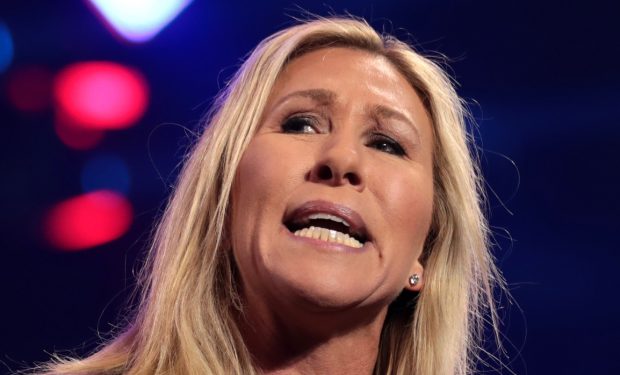MAGA Congresswoman Marjorie Taylor Greene (R-GA) echoed the recent words of Speaker of the House Mike Johnson (R-LA) when she wrote on X that the Senate’s new emergency aid bill for Ukraine and Israel, which includes $60.1 billion for Ukraine, is “DEAD ON ARRIVAL IN THE HOUSE!!!”
Greene, who has long opposed sending additional aid to Ukraine, added a skull and bones emoji to her announcement and a threat to her colleagues on Capitol Hill: “Any Republican that votes for this career will be over.”
DEAD ON ARRIVAL IN THE HOUSE!!!
— Rep. Marjorie Taylor Greene
Any Republican that votes for this career will be over. https://t.co/OZSvXktvBA(@RepMTG) February 12, 2024
Greene amplified the post of fellow MAGA legislator, Senator J.D. Vance (R-OH), who wrote a memo to “every one” of his Republican colleagues in Congress.
Vance’s two-page memo, titled ‘The Ukraine Supplemental Includes a Hidden Impeachment Clause Against President,’ quotes Trump on the Ukrainian-Russian war — “We got to get that war settled and I’ll get it settled” — and Trump’s claim that he would “resolve the war in 24 hours,” which Ukrainian President Zelensky has refuted and called “dangerous.”
Vance’s memo claims that Trump was “wrongfully impeached” in 2019, on a charge at the core of which was the then-President pausing funds appropriated for Ukraine.
Note: Trump was impeached for abuse of power and obstruction of Congress — he was accused “of corruptly using the levers of government to solicit election assistance from Ukraine in the form of investigations to discredit his Democratic political rivals,” reported the New York Times.
In his memo, Vance warns that the new round of Ukraine funding, which would expire on September 30, 2025, could trigger another impeachment of Trump, if he is re-elected in 2024.
Vance wrote: “Buried in the bill’s text is an impeachment time bomb for the next Trump presidency if he tries to stop funding the war in Ukraine. We must vote against this disastrous bill.”
Greene adds her threat to Vance’s warning. The bill has bipartisan Senate support, including from Minority Leader Mitch McConnell (R-KY).

